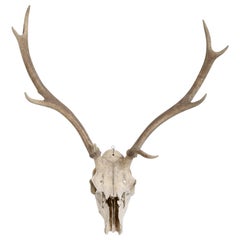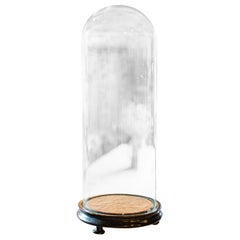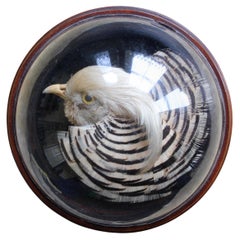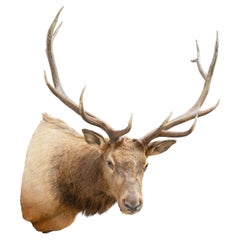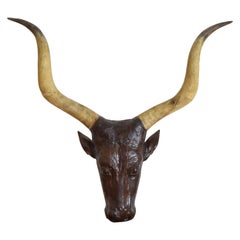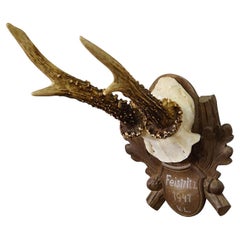Taxidermy
1960s French Country Vintage Taxidermy
Antler
Mid-19th Century British Early Victorian Antique Taxidermy
Glass, Pine
Late 19th Century English Antique Taxidermy
Natural Fiber, Glass, Hardwood
Early 20th Century American Taxidermy
Antler, Hide
1860s French Antique Taxidermy
Horn, Walnut
Mid-20th Century German Black Forest Taxidermy
Wood, Antler
21st Century and Contemporary European Taxidermy
Leather
Mid-19th Century German Black Forest Antique Taxidermy
Wood, Antler
Early 20th Century European Taxidermy
Antler
Late 20th Century American Taxidermy
Wood
1870s Austrian Sporting Art Antique Taxidermy
Horn
Mid-20th Century German Black Forest Taxidermy
Antler, Wood
20th Century American Folk Art Taxidermy
Organic Material
1920s English Sporting Art Vintage Taxidermy
Animal Skin
Late 20th Century German Rustic Taxidermy
Metal
Early 20th Century German Rustic Taxidermy
Horn, Blown Glass
21st Century and Contemporary American Victorian Taxidermy
Feathers, Driftwood
1920s African Vintage Taxidermy
Horn
Mid-20th Century Unknown Rustic Taxidermy
Feathers
2010s American Taxidermy
Other
Mid-20th Century German Rustic Taxidermy
Antler, Wood
Late 19th Century English Antique Taxidermy
Tortoise Shell
Mid-20th Century German Rustic Taxidermy
Antler, Wood
21st Century and Contemporary South African Taxidermy
Fur, Wood
2010s Taxidermy
Other
Early 20th Century German Rustic Taxidermy
Antler, Wood
1970s American Organic Modern Vintage Taxidermy
Shell
19th Century Australian Late Victorian Antique Taxidermy
Other
Early 20th Century German Black Forest Taxidermy
Antler, Wood
Late 20th Century German Rustic Taxidermy
Antler, Wood
Mid-20th Century American Taxidermy
Animal Skin
Mid-20th Century German Black Forest Taxidermy
Wood, Antler
21st Century and Contemporary Taxidermy
Animal Skin
21st Century and Contemporary African Victorian Taxidermy
Feathers, Wood
1960s French Vintage Taxidermy
Antler
19th Century English Antique Taxidermy
Natural Fiber, Oak
Early 2000s American Taxidermy
Horn, Hide
Late 20th Century American Taxidermy
Animal Skin
Early 20th Century German Black Forest Taxidermy
Antler, Wood
Late 20th Century German Rustic Taxidermy
Metal
Early 20th Century German Rustic Taxidermy
Horn, Blown Glass
Early 20th Century German Black Forest Taxidermy
Antler, Wood
19th Century European Antique Taxidermy
Natural Fiber
1960s French Country Vintage Taxidermy
Antler
2010s American Taxidermy
Animal Skin
Late 19th Century English Antique Taxidermy
Silver
20th Century Art Deco Taxidermy
Crocodile
Early 1900s Antique Taxidermy
Bone, Horn
2010s Taxidermy
Other
Mid-20th Century German Rustic Taxidermy
Antler, Wood
Mid-19th Century German Black Forest Antique Taxidermy
Wood, Antler
Late 19th Century English Victorian Antique Taxidermy
Sterling Silver
2010s American Taxidermy
Fur, Birch
Mid-20th Century Unknown Rustic Taxidermy
Horn
21st Century and Contemporary American Victorian Taxidermy
Wood, Feathers
20th Century South African Modern Taxidermy
Animal Skin
21st Century and Contemporary Taxidermy
Shagreen
Mid-20th Century Unknown Rustic Taxidermy
Horn
Early 20th Century Unknown Rustic Taxidermy
Horn
Early 19th Century English Regency Antique Taxidermy
Brass
Decorating with Antique, New and Vintage Taxidermy
The centuries-old practice of taxidermy continues to enjoy remarkable longevity, with today's top designers making mounted and preserved animals key elements of their decor.
Taxidermy captures animals in an eternal moment of animation, so perhaps it’s fitting that the deployment of these preternaturally preserved creatures — and other natural specimens — as decorative accents has endured far longer than the sell-by-date for most design trends. Certainly, the style-setting enthusiasts of tasteful decorating with taxidermy are as passionate as they are many.
Martha Stewart is a lifelong lover of the preservationist’s art, and she has proudly posed with the vintage game birds, foxes and bears that adorn Skylands, her 1920s retreat in Seal Harbor, Maine. Angelina Jolie began an avian menagerie when her daughter Shiloh brought home a dead bird she wanted to keep as a pet. Danielle Steel has an elegant Paris residence packed with exotic specimens, including a giraffe in the foyer. Over-the-top taxidermy remains the flashy signature of party planner and decorator extraordinaire Ken Fulk.
For Chicago decorator Summer Thornton, the reason for taxidermy’s persistent appeal is obvious: “There’s nothing more beautiful than natural creation.” New York designer Ryan Korban agrees: “They add a layer of whimsy to a room that no other decorative arts element can give.” Patrick Mele, another New York designer, thinks there’s a spiritual component to this attraction. These creatures, he says, “are a special gift to be around. Birds, especially, are so colorful they look hyper-real. They remind us that those crazy colors are right there in nature.”
In the vast inventory of collectibles and curiosities on 1stDibs, find antique, new and vintage preserved and mounted taxidermy specimens for your Wunderkammern, mantle or carefully curated home library.
